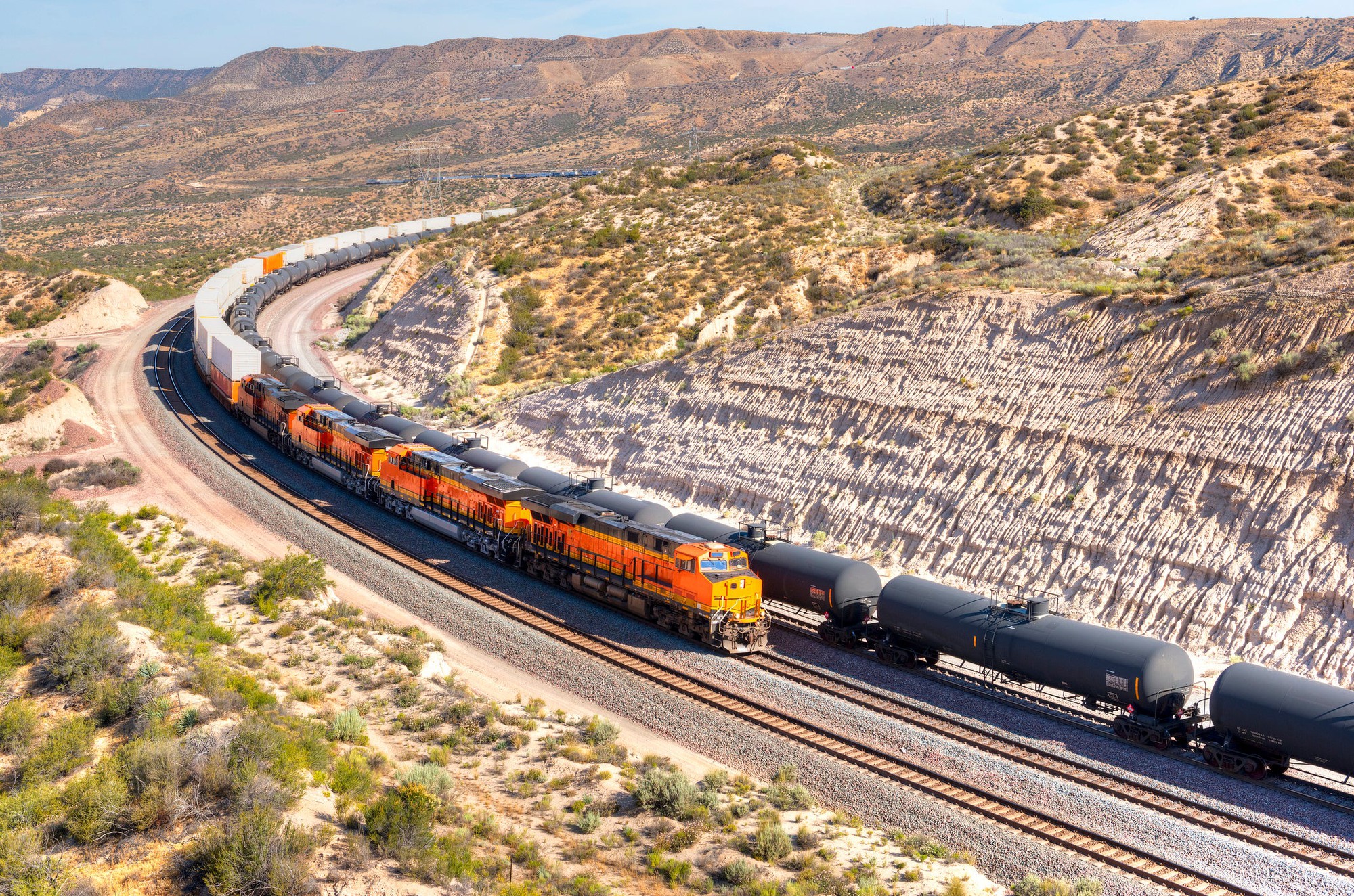Inspectors are still combing through the remains of a CSX Corp. (NYSE: CSX) train wreck that occurred in Lynchburg, Va., earlier this month to determine what caused the derailment of the 15 cars en route to the All Plains American Pipeline Center in Yorktown, Va. The 25-train convoy derailment has made CSX national news, giving every indication that this might be a "runaway train" scenario for its share price following a tightening of legislation by U.S. and Canadian authorities.
Black gold
In 2008, U.S Class 1 railroads transported nearly 9,500 carloads of crude oil. By 2013, the amount of crude transported by freight increased to over 400,000 carloads, or over 280 million barrels, with the amount increasing in response to new oil finds in the Bakken in North Dakota as well as the Eagle Ford and Permian Basin in Texas. This surge in the amount of American crude oil being produced along with the delays involved in moving it by oil pipelines, has lead to growth in transporting oil by freight rail throughout the U.S. With 45% of the United States' refining facilities in the Gulf Coast and a significant presence in the Midwest and East Coast, CSX's geographic hold on the incoming crude from Canada, the transcontinental shipments from North Dakota, and access to the Gulf Coast refineries east of the Mississippi, make it uniquely positioned to be able to turn oil into a primary addition to the products the company transports.
CSX certainly has not let this fact slip by. The second-largest railroad in the United States, in the last few years, has capitalized on this oil boom to fill its need to build diversified product lines in the wake of weak global coal demand to expand, and thus has become the East Coast's leader in crude transportation. Having already sunk $26 million to the northeast region to accommodate and facilitate greater crude oil transport, CSX looks be be making plans for the long term and seeing the freight transport of crude oil as a strategic market they can excel in. With roughly 700 barrels of crude oil per tank car, and 100-120 cars per train, CSX makes a point of pride to state on its website that it is "capable of handling the largest possible tank cars, maximizing your barrels per car" . These investments seem to have already paid off -- PBF Energy and Phillips 66 both announced that they are expanding some East Coast terminals to accommodate 240,000 barrels per day in areas like New Jersey and Toledo, both safely within CSX's home turf.
Deadly derailments to determine legislation
Although the amount of crude oil spilled is significantly lower than those of a standard pipeline ( 2.2 gallons per million ton mile vs. 6.3 per million ton mile for pipelines), such highly public spills and derailments have caused a huge surge in public perception about safety and the implications of mile-long crude oil transport trains. Following shortly after a similar accident in Casselton, N.D., which spilled 400,000 gallons of crude oil, and a deadly derailment in Quebec in July 2013 which killed 47 people, Canadian and U.S. regulators are beginning to question the safety measures of transporting crude oil by freight. This, coupled with the submission of a recent U.S. Department of Transportation recommendation to Congress, leave many wondering what effect these proposed regulations will have on the rail freight industry, specifically the Rail Safety Improvement Act of 2008.
One of the biggest causes for concern has been the use of the DOT-111 transportation cars. In all three of the previously mentioned derailments, DOT-111s have been identified as the source of the leak or puncture. Canadian Transportation Minister Lisa Raitt has already decreed that, in Canada, the DOT-111s must be overhauled or retired within three years. If the Department of Transportation recommendation to Congress says the same thing it would mean that over 65,000, or 70%, of tanker containers in the United States would have to be replaced in less time it would take us to get from one leap year to the next.
Can't update what you don't own
The American Railroad Association has already acknowledge that 55,000 new CPC-1232 cars to replace the malfunctioning DOT-111s would amount to an industry investment of $7 billion. Not including 75,000 DOT-111s with the ability to be retrofitted to fit Canadian code at a cost of $20,000-$40,000 per car, it would seem that freight companies would have to go out an pull up the golden spikes from their rail lines to pay for the upgrades. This is where CSX stands apart from its competitors. Of the over 45,000 DOT-111s in North America, CSX owns none of them. In fact, CSX does not own any of the tank cars used to transport crude oil, corn syrup, or any other material that may have to be transported under the conditions necessary for specialized cars. While other companies are buying their tank cars outright, CSX has partnered with freight tank supplier GATX (NYSE: GMT) to provide a one-stop-shop for its speciality chemical customers, not just crude oil companies. Citing the difficulty in keeping specialty tank cars uncontaminated, CSX has instead directed its customers to GATX, opting instead to allow GATX to decide how these costs will be passed on.
All aboard the CSX Express
The freight industry delivers 99.9% of all freight transported crude oil from origin to destination with no ill effects, but it becomes hard to cite that statistic when oil is spilling from tankers and people are being evacuated from nearby buildings. While it would be presumptuous to say that this was just an unfortunate accident until the official inquiry is made public, CSX looks to be able to bounce back from this detrimental public perception and will be uniquely positioned to handle the changing dynamic of shipping crude oil by freight. From its geographic positioning of providing logistics and transport from Canada and North Dakota, to its ability to avoid getting bogged down by costly tanker car renovations, CSX looks to be able to avoid costly capital expenditures while increasing its ability to be competitive in the freight market. While any new legislation, or updates to the Rail Safety Improvement Act, would certainly affect the ability of CSX to maintain its current operational levels, the regulations will affect the entire industry and would still leave CSX uniquely positioned to take the lead in crude oil transportation by freight.






